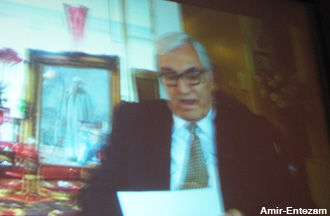
In a few days, 10 years will have passed since the brutal death of Dariush and Parvaneh Forouhar. Later Mohammad Mokthari, Ja’far Pouyandeh and Majid Sharif were abducted and strangled by rogue agents of the Ministry of Intelligence of the Islamic Republic. To this day, the case of all the murdered victims remains unsolved. No one has really been charged and no one has been imprisoned. Yet, the best and the brightest of our young journalists, women activists and even some of their lawyers have been incarcerated, and the saga continues. The lucky ones get to leave but they, too, have to struggle.
The other day, Mr. Abbas Amir Entezam in an e-mail message said that he may have to go back to prison after a furlough. The date is set for the 30th of Aban. Whether this is just a threat or it’s real, it is intimidation, psychological warfare, an all too familiar tactic on the part of the Islamic Republic: to let their opponents always be on guard. They routinely accuse everyone of conspiring with the enemy, acting against national security and being spies! It is the norm rather than the exception. The men and women who go back to Iran to visit their loved ones or just do something positive and productive are arrested without any real charges, and immediately their families have to post a huge bail, usually their homes, an easy way to scare them and their families. Dozens of names come to mind.
And the President of the Republic, the mouthpiece of the great leader has the audacity to say that there is absolute freedom in Iran! Oddly enough, it was Ahmadi Nejad who appointed Pour Mohammadi , Deputy Minister of Information at the time of the serial murders, as his Minister of Interior.
Mokhtari was a writer and a poet.
Pouandeh was a translator.
Sharif was a journalist.
Dairush and Parvaneh were national heroes and political activists.
On this day, every year, I always try to call the Foroushars’ son and daughter, just to let them know that we have not forgotten and will never forget. It is up to them to forgive. It is unclear whether they can even hold a memorial service in honor of their loved ones who perished in the month of November and December a decade ago.
I also get emails from friends, journalists from Iran who ask for help, but I am helpless. The latest casualty of the ban on print media has been Shahrvand. A friend of mine, a journalist, is now jobless. I asked him what he was going to do. He said he didn’t know. Something will come up, he said. He is still hopeful . There is no way to survive this situation except to be hopeful. Nevertheless, he told me, “in this country we want to try to live a thousand times over but every time they remind us of death.”
How long will this go on? How long can people who want nothing except lead normal lives, have a job, go to work, make decent money and tend to their families and just be free, go on with this charade?
When Dariush Forouhar first went to prison the trees in the prison yard were still saplings. He was still in and out of prison when the trees were fully grown. All his life, he hoped to see a free and democratic Iran. The trees are getting old, but the dream has yet to come true.
A decade has passed since the brutal serial murders. It’s been almost 30 years since Abbas Amir Entezam was arrested on false charges and imprisoned. He is now in his late seventies, in poor health, but he still ends every email by saying “Be omid-e Azadi-ye Iran. “
No dictatorship lasts forever. This Islamic Republic may still abuse popular sentiment to cry wolf, but there will come a time when even that may not work.
It’s about time for this regime and its leaders, to give up on their monoploy on power and let real elections take place. It may be wishful thinking but as my journalist friend said, we cannot give up hope.






